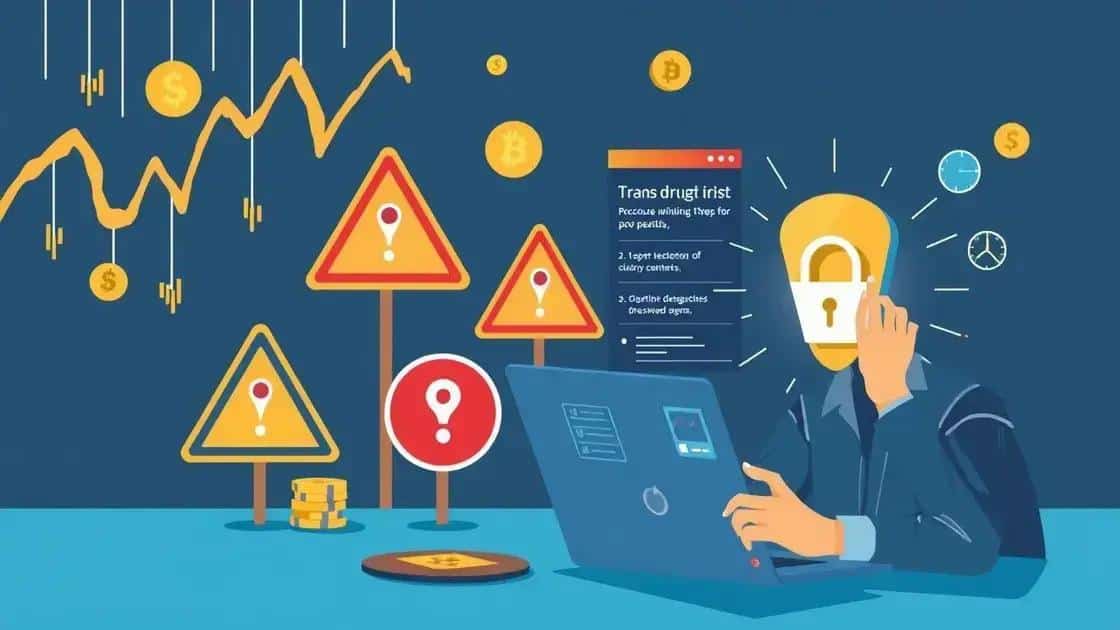Cryptocurrency: Unlocking the Future of Finance

Anúncios
Cryptocurrency is a digital currency that uses blockchain technology for secure transactions, offering potential high returns but also significant risks such as market volatility and security threats.
Cryptocurrency has become a buzzword in financial circles, but what does it really mean for you? As digital currencies gain traction, they promise to reshape how we approach money and transactions. Let’s dig into the fascinating world of cryptocurrency together.
Anúncios
What is cryptocurrency?
Cryptocurrency refers to a type of digital or virtual currency that uses cryptography for security. Unlike traditional currencies, cryptocurrencies operate on a technology called blockchain, which is a decentralized system that records all transactions across a network of computers. This ensures that the information is transparent and secure.
Curious about how it all began? The first cryptocurrency, Bitcoin, was created in 2009, and since then, thousands of other cryptocurrencies have emerged, each offering unique features. In this expansive ecosystem, you might find popular options like Ethereum and Ripple, each designed for different purposes.
Anúncios
Key Features of Cryptocurrency
Understanding the fundamental characteristics of cryptocurrency can help you grasp its significance. Here are several key features:
- Decentralization: Unlike traditional banks, cryptocurrencies are not controlled by any central authority.
- Security: Transactions are secured with cryptographic techniques, making them resistant to fraud.
- Anonymity: Users can transact with a certain level of privacy, as identities are not tied to accounts.
- Global Access: Cryptocurrencies can be sent or received anywhere in the world, making them highly accessible.
Many people wonder about the advantages of using cryptocurrencies. They can facilitate faster transactions with lower fees when compared to traditional banking methods. For instance, international transfers can take days through banks, while cryptocurrency transactions may complete in minutes or even seconds.
Moreover, the rise of smart contracts—self-executing contracts with the terms directly written into code—demonstrates the innovation linked to cryptocurrencies. These have the potential to revolutionize industries by automating agreements and reducing the need for intermediaries.
While the various aspects of cryptocurrency can be intriguing, it’s essential to stay cautious. The market can be volatile, and understanding the risks involved is crucial for anyone considering investing. There are many opportunities, but like all investments, they come with potential downsides.
The benefits of investing in cryptocurrency

Investing in cryptocurrency can offer a range of benefits that attract both new and experienced investors. One major allure is the potential for high returns. Many early adopters of popular cryptocurrencies like Bitcoin have seen substantial profits. This high reward potential is a motivating factor for many.
Beyond just profits, cryptocurrencies provide a unique way to diversify your investment portfolio. When traditional markets fluctuate, cryptocurrencies may perform differently, which can reduce the overall risk of an investment strategy.
Key Advantages of Cryptocurrency Investments
Understanding the advantages of investing in cryptocurrency helps in making informed decisions. Here are key benefits:
- Accessibility: Cryptocurrencies can be bought and sold 24/7, providing flexibility for investors.
- Low transaction fees: Compared to traditional financial systems, many cryptocurrencies allow lower fees for transactions.
- Potential for gains: The volatility in cryptocurrency markets can lead to significant price increases.
- Decentralization: Investors gain independence from central authorities or banks.
Additionally, cryptocurrencies can facilitate fast and inexpensive cross-border transactions. Traditional banking systems often impose delays and additional charges for international transfers, whereas cryptocurrency transactions can be completed almost instantly at a fraction of the cost.
Another appealing factor is the technology behind cryptocurrencies. Innovations like smart contracts enable automatic transactions once conditions are met, minimizing the need for intermediaries and reducing potential errors in the process. As blockchain technology continues to evolve, it opens up further opportunities for investors.
While there are many advantages to consider, it’s essential to remain aware of the risks involved. Market volatility can lead to sudden price drops, so caution is key for anyone looking to invest in this space. Knowledge and research are vital for making wise investment decisions in the ever-changing world of cryptocurrency.
Understanding blockchain technology
Blockchain technology is the backbone of all cryptocurrencies. It is a decentralized ledger that records all transactions across a network of computers. This means that no single entity, like a bank, has control over the entire system. Instead, everyone in the network can access and verify the data.
One of the key features of blockchain technology is its security. Each block in the chain contains a number of transactions, and once a block is filled, it is added to the chain in a linear, chronological order. Since each block is linked to the previous one through cryptographic hashes, altering any information in a previous block would require changing every subsequent block. This makes manipulation extremely difficult.
Key Components of Blockchain
To fully appreciate how blockchain technology works, it is essential to understand its main components:
- Blocks: These are individual units that store transaction data.
- Nodes: Computers that validate and relay transactions on the network.
- Miners: Individuals who use their computing power to solve complex mathematical problems to add new blocks to the blockchain.
- Consensus Mechanisms: Methods for achieving agreement on the network about the validity of transactions.
The beauty of blockchain technology lies in its transparency. Every transaction is recorded on the blockchain and can be viewed by anyone. This reduces the risk of fraud and increases trust in the system. Moreover, the decentralized nature of this technology means that it is resistant to censorship, making it a powerful tool for various applications beyond just currency.
From supply chain management to voting systems, blockchain technology is finding its way into numerous industries. Its potential to provide secure, transparent, and efficient solutions is driving innovation and attracting attention from businesses and investors alike. As more people learn about its benefits, the adoption of blockchain technology is likely to grow even more.
Risks and challenges in cryptocurrency

Investing in cryptocurrency comes with its own set of risks and challenges that every investor should consider. As exciting as the potential returns may be, understanding these risks is crucial for making informed decisions.
One of the primary risks is market volatility. Cryptocurrency prices can fluctuate dramatically, often within hours or even minutes. This wild price movement can lead to significant profits, but it can also result in substantial losses. Investors need to be prepared for the possibility of sudden downturns.
Key Risks in Cryptocurrency
Here are several notable risks associated with cryptocurrency investments:
- Security Risks: Although blockchain technology is secure, exchanges and wallets can be vulnerable to hacks and theft.
- Regulatory Risks: Governments around the world are still figuring out how to regulate cryptocurrencies, which can lead to sudden changes in laws or policies.
- Lack of Consumer Protections: Unlike traditional banks, there are limited protections for investors in cryptocurrency markets.
- Market Manipulation: Smaller cryptocurrencies can be influenced by large holders, leading to price manipulation.
Another challenge is the complexity of the technology itself. Many potential investors find it difficult to understand how cryptocurrency and blockchain technology work, which can be a barrier to entry. Without proper knowledge, it’s easy to make costly mistakes.
Furthermore, the risk of scams is prevalent in the cryptocurrency space. Fraudulent schemes and Ponzi schemes can deceive unsuspecting investors. Therefore, it’s essential to conduct thorough research before making any investment.
Lastly, liquidity can be an issue for smaller cryptocurrencies. If you own a lesser-known coin, it may not be easy to sell it at your desired price without causing a drop in its value. Recognizing these challenges can help investors navigate the complex landscape of cryptocurrency.
In conclusion, investing in cryptocurrency offers exciting opportunities but comes with significant risks. Understanding the technology, market volatility, and potential challenges is crucial for anyone looking to enter this space. By doing thorough research and remaining vigilant, you can navigate this dynamic market more effectively. Remember, always stay informed and cautious as you explore the world of digital currencies!
FAQ – Frequently Asked Questions about Cryptocurrency
What is cryptocurrency?
Cryptocurrency is a type of digital or virtual currency that uses cryptography for security and operates on a technology called blockchain.
What are the main risks of investing in cryptocurrency?
The main risks include market volatility, security threats, regulatory changes, and potential scams.
How can I invest safely in cryptocurrencies?
To invest safely, conduct thorough research, use reputable exchanges, secure your digital wallet, and only invest what you can afford to lose.
What are the benefits of using blockchain technology?
Blockchain technology provides security, transparency, and decentralization, which can enhance various applications beyond just currency.






